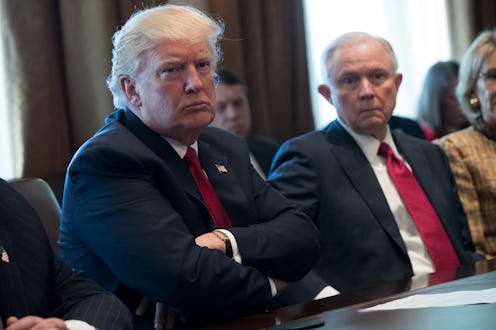News
Trump Is Restarting The War On Drugs

The Obama administration took significant steps to scale back the war on drugs and reduce incarceration rates, in part by directing federal prosecutors in 2013 to seek the most severe sentences only for "serious, high-level, or violent drug traffickers." Many had hoped that this would usher in an end to the disastrous, decades-long war on drugs, but alas, it will not: On Friday, Attorney General Jeff Sessions rescinded Obama's drug reforms, and instead ordered prosecutors to seek the maximum punishment for drug offenders, including mandatory minimum sentences.
"[I]t is a core principle that prosecutors should charge and pursue the most serious, readily provable offense," Sessions wrote in the memo, which he sent to over 5,000 assistant U.S. Attorneys on Friday. "By definition, the most serious offenses are those that carry the most substantial guidelines sentence, including mandatory minimum sentences." In a speech the day before issuing the memo, Sessions said that "we've got too much complacency about drugs," adding that drug abuse is a "threat to our country."
In essence, Trump and Sessions are doubling down on the war on drugs. And the war on drugs has been nothing short of a disaster for people of color. By the most charitable interpretation, the drug war disproportionately punished black and Latino Americans. By the least charitable interpretation, the drug war is the new Jim Crow — a conscious and knowing attempt to incarcerate people of color.
The statistics make this clear. Black people comprise 13 percent of the U.S. population, and statistics from the National Survey on Drug Use and Health show that they use drugs at similar rates as as other races. And yet, 40 percent of people incarcerated in federal prisons on drug charges are black, according to the Drug Policy Alliance. The same goes for Latino Americans, who make up just 17 percent of the overall population but 37 percent of the population imprisoned on federal drug charges. As of 2011, there were more black men in U.S. prisons than were enslaved in 1850, according to Ohio State University law professor Michelle Alexander.
People of color have suffered far more in the war on drugs than white people, and that's clear even if you don't make any judgements regarding the intention behind federal drug policies. Sessions' decision to reverse Obama's drug reforms marks a sweeping change in federal policy, and it will be absolutely catastrophic for people of color in America. Given the policies they support and the kind of rhetoric they spout, it's not unwarranted to read into Trump and Sessions' motives here.
Sessions built his career on prosecuting civil rights leaders who registered black voters, and once called the NAACP "un-American." He opposes the Voting Rights Act and reportedly said that he was "OK" with the Ku Klux Klan — until he found out that they smoked marijuana. A former black colleague of his, J. Gerald Herbert, testified in front of Congress that Sessions called him "boy" and told him to "be careful what you say to white folks."
Trump, meanwhile, was sued in the 1970s for allegedly refusing to rent apartments to non-white applicants. In 1989, he spent $85,000 on a newspaper ad calling for the execution of five black and Latino teenagers who had been accused of raping a white woman; after the suspects were exonerated, Trump refused to take back his words. During his presidential campaign, he said that a federal judge couldn't possibly rule fairly on a Trump-related lawsuit, because the judge "is a Mexican."
Trump and Sessions both have sordid record on their treatment of people of color throughout their lives; now, they're pushing a policy that will wreak havoc on those communities. They may resort to many excuses for reversing Obama's drug reforms, but for people of color, it's not hard to see what their intentions are here.